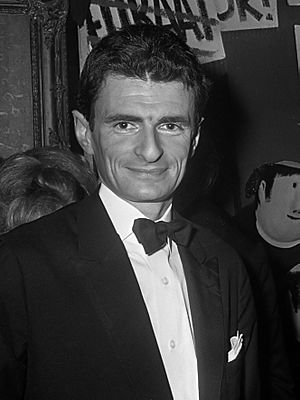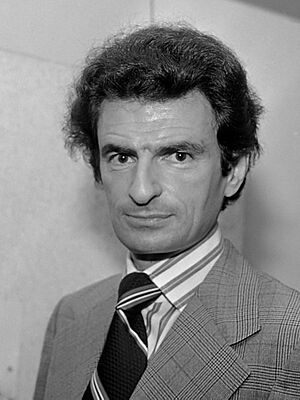Jerzy Kosiński facts for kids
Quick facts for kids
Jerzy Kosiński
|
|
|---|---|

Kosiński in 1969
|
|
| Born |
Józef Lewinkopf
June 14, 1933 Łódź, Poland
|
| Died | May 3, 1991 (aged 57) New York City, U.S.
|
| Education | University of Łódź |
| Occupation | Novelist |
| Spouse(s) |
Mary Hayward Weir
(m. 1962; div. 1966)Katherina "Kiki" von Fraunhofer
(m. 1968) |
| Signature | |
Jerzy Kosiński (born Józef Lewinkopf; June 14, 1933 – May 3, 1991) was a Polish-American writer. He wrote most of his books in English. He was also the president of the American Chapter of P.E.N., an organization for writers.
Jerzy was born in Poland. He survived World War II as a Jewish person hiding his identity. Later, he moved to the United States and became an American citizen. He is famous for his novels like Being There (1971) and The Painted Bird (1965). Both of these books were later made into movies.
Contents
Jerzy Kosiński's Life Story
Jerzy Kosiński was born Józef Lewinkopf in Łódź, Poland, in 1933. His parents were Jewish. During World War II, when he was a child, he lived in occupied central Poland. His father gave him a false identity, Jerzy Kosiński, to keep him safe.
A Catholic priest helped him get a fake baptism certificate. His family survived the Holocaust because local villagers helped them. These villagers often risked their own lives to help Polish Jews. Jerzy's family even lived openly in one village and attended church. For a time, a Catholic family also sheltered them. Jerzy even served as an altar boy in the local church.
After the war, Jerzy and his parents moved to Jelenia Góra. His father supported the new communist government in Poland, which helped the family live comfortably. By the time he was 22, Jerzy had earned degrees in history and sociology from the University of Łódź. He also worked as a teaching assistant. He even studied in the Soviet Union and served in the Polish Army.
Moving to the United States
In 1957, Kosiński wanted to move to the United States. To do this, he created a fake organization that supposedly sponsored him. He later said he forged letters from communist leaders to make it look like he would return to Poland. This was required for anyone leaving the country at that time.
When he first arrived in the U.S., Kosiński worked many different jobs, like driving a truck. He also managed to graduate from Columbia University. In 1965, he became an American citizen. He received special grants, like the Guggenheim Fellowship in 1967 and the Ford Foundation in 1968. These grants helped him write a political book.
In 1970, he won an award for literature from the American Academy of Arts and Letters. These opportunities allowed him to teach at famous universities like Yale and Princeton. Kosiński also enjoyed photography and had his artwork shown in galleries.
Family Life
In 1962, Kosiński married Mary Hayward Weir, who was a wealthy American steel heiress. They divorced four years later. Mary passed away in 1968. Kosiński wrote about their marriage in his novel Blind Date, using a different name for Mary. In 1968, he married Katherina "Kiki" von Fraunhofer, who was a marketing consultant.
Later Life and Passing
Toward the end of his life, Kosiński faced several health problems. He passed away on May 3, 1991. As he wished, he was cremated. His friend, Oscar de la Renta, scattered his ashes near his home in the Dominican Republic.
Famous Books by Jerzy Kosiński
Many of Kosiński's books became bestsellers and were translated into over 30 languages. By 1991, his books had sold an estimated 70 million copies.
The Painted Bird
The Painted Bird is a novel Kosiński wrote in 1965. It tells a fictional story about a young boy during World War II. The boy, whose background is unknown, wanders through parts of Eastern Europe. He stays with many different people, some of whom are very cruel to him or others.
After the book came out in the U.S., the communist government in Poland said it was "anti-Polish." The book was banned in Poland until the communist government fell in 1989. When it was finally printed there, thousands of people waited in long lines to buy copies signed by Kosiński. A Polish literary critic, Paweł Dudziak, said that even though the author's role was unclear, The Painted Bird was an important book in English literature. He explained that since it's a fictional story, people shouldn't take it too literally when accusing it of being anti-Polish.
Many famous writers praised the book. Elie Wiesel called it "one of the best" and written with "deep sincerity."
Steps
Steps (1968) is another novel by Kosiński. It's made up of many short, connected stories. This book won the U.S. National Book Award for Fiction.
The American novelist David Foster Wallace described Steps as a collection of "unbelievably creepy little allegorical tableaux." He said the writing style was unique and elegant.
Being There
One of Kosiński's most important books is Being There (1971). It's a funny and smart look at how strange America's media culture can be. The story is about Chance, a simple gardener. He doesn't have many special qualities, but he suddenly becomes important. He ends up advising a powerful businessman and even a presidential adviser.
Chance's simple answers to big problems are seen as brilliant ideas, even though no one really understands what he means. People wonder about his past, but it's impossible to find out where he came from.
The novel was made into a movie in 1979. It was directed by Hal Ashby and starred Peter Sellers and Melvyn Douglas. Peter Sellers was nominated for an Academy Award for his role, and Melvyn Douglas won an Academy Award. Kosiński helped write the movie's script. The film won several awards for its screenplay.
TV, Radio, and Film Appearances
Jerzy Kosiński appeared on The Tonight Show Starring Johnny Carson many times between 1971 and 1973. He was also a guest on The Dick Cavett Show. He even posed for a cover photo for The New York Times Magazine. In 1982, he presented an Oscar for screenwriting.
He also acted in the movie Reds, playing a revolutionary named Grigory Zinoviev. Critics praised his performance in the film.
Friendships
Kosiński was friends with Roman Polanski, a famous film director. They both went to film school together in Poland.
Svetlana Alliluyeva, who was the daughter of Joseph Stalin, was also a friend of Kosiński. She appears as a character in his novel Blind Date.
Kosiński wrote his novel Pinball (1982) for his friend George Harrison, who was a member of The Beatles.
Filmography
- Being There (novel and screenplay, cameo in gala scene, 1979)
- Reds (actor, 1981) – Grigory Zinoviev
- The Statue of Liberty (1985) – Himself
- Łódź Ghetto (1989) – Mordechai Chaim Rumkowski (voice)
- Religion, Inc. (actor, 1989) – Beggar (final film role)
- Nabarvené ptáče (film) (2019, orig. The Painted Bird)
Awards and Honors
- 1966 – Prix du Meilleur Livre Étranger (Best Foreign Book Award) for The Painted Bird
- 1969 – National Book Award for Steps
- 1970 – Award in Literature, National Institute of Arts and Letters and American Academy of Arts and Letters
- 1973–75 – President of the American Chapter of P.E.N. (served two terms)
- 1974 – B'rith Shalom Humanitarian Freedom Award
- 1977 – American Civil Liberties Union First Amendment Award
- 1979 – Writers Guild of America, East Best Screenplay Award for Being There (shared with Robert C. Jones)
- 1980 – Polonia Media Perspectives Achievement Award
- 1981 – British Academy of Film and Television Arts (BAFTA) Best Screenplay of the Year Award for Being There
- International House Harry Edmonds Life Achievement Award
- Received honorary PhD from Spertus College of Judaica
- 1988 – Received honorary PhD from Albion College, Michigan
- 1989 – Received honorary PhD from State University of New York at Potsdam
See also
 In Spanish: Jerzy Kosiński para niños
In Spanish: Jerzy Kosiński para niños


